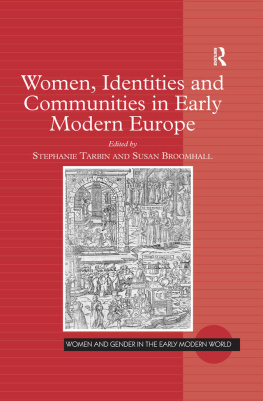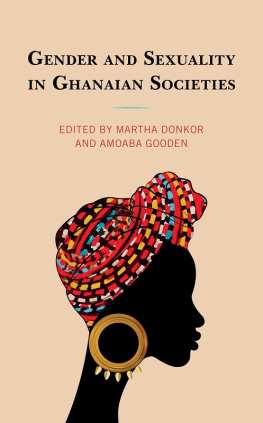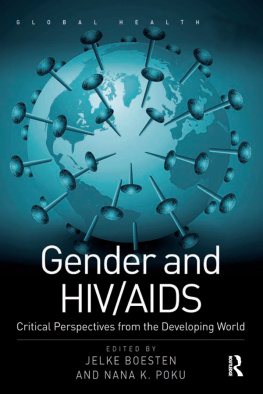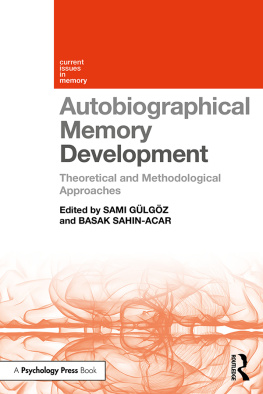Gender & Memory
First published by Oxford University Press in 1996. The Several Contributors, 1996.
Published 2005 by Transaction Publishers
Published 2017 by Routledge
2 Park Square, Milton Park, Abingdon, Oxon OX14 4RN
711 Third Avenue, New York, NY 10017, USA
Routledge is an imprint of the Taylor & Francis Group, an informa business
All rights reserved. No part of this book may be reprinted or reproduced or utilised in any form or by any electronic, mechanical, or other means, now known or hereafter invented, including photocopying and recording, or in any information storage or retrieval system, without permission in writing from the publishers.
Notice:
Product or corporate names may be trademarks or registered trademarks, and are used only for identification and explanation without intent to infringe.
Library of Congress Catalog Number: 2005041923
Library of Congress Cataloging-in-Publication Data
Gender and memory / Selma Leydesdorff, Luisa Passerini, and
Paul Thompson, editors; with a new introduction by Selma Leydesdorff.
p. cm.(Memory and narrative series)
Includes bibliographical references.
ISBN 1-4128-0463-9 (pbk. : alk. paper)
1. Oral history. 2. Memory. 3. Sex. I. Leydesdorff, Selma.
II. Passerini, Luisa. III. Thompson, Paul Richard, 1935
IV. Memory and narrative.
D16.14.G46 2005
305.3-dc22
2005041923
ISBN 13: 978-1-4128-0463-9 (pbk)
Gender & Memory
Edited by Selma Leydesdorff,
Luisa Passerini & Paul Thompson
With a new introduction by Selma Leydesdorff
Memory and Narrative Series

Gender
& Memory
Memory and Narrative Series Mary Chamberlain and Selma Leydesdorff, series editors
Trauma: Life Stories of Survivors Kim Lacy Rogers and Selma Leydesdorff, editors (with Graham Dawson)
Commemorating War: The Politics of Memory Timothy G. Ashplant, Graham Dawson, and Michael Roper, editors
Environmental Consciousness: The Roots of a New Political Agenda Stephen Hussey and Paul Thompson, editors
Memory and Memorials: From the French Revolution to World War One Mathew Campbell, Jacqueline M. Labbe, and Sally Shuttleworth, editors
The Stasi Files Unveiled: Guilt and Compliance in a Unified Germany Barbara Miller
The Uses of Narrative: Explorations in Sociology, Psychology, and Cultural Studies Molly Andrews, Shelley Day Sclater, Corinne Squire, and Amal Treacher, editors
Narrative and Genre: Contexts and Types of Communication Mary Chamberlain and Paul Thompson, editors
The Clash of Economic Cultures: Japanese Bankers in the City of London Junko Sakai
Narratives of Exile and Return Mary Chamberlain
Contents
Introduction to the Transaction Edition
SELMA LEYDESDORFF
List of Contributors
SELMA LEYDESDORFF, LUISA PASSERINI, and PAUL THOMPSON
RICHARD ELY and ALLYSSA MCCABE
MARINA MALYSHEVA and DANIEL BERTAUX
EVA BRUCKER
CARMEN LARRANAGA
RENATE SIEBERT
ADRIANA PISCITELLI
ULRIKE SCHUERKENS
ELISABETH J. CROLL
JUDITH MODELL and JOHN HINSHAW
KATE DARIAN-SMITH
GWYN DANIEL and PAUL THOMPSON
REVIEW ARTICLE
Border Crossings: Recent Feminist Auto/biographical Theory
LAURA MARCUS
Introduction to the Transaction Edition
Gender and Memory Ten Years On
Selma Leydesdorff
What is New?
Nearly ten years have elapsed since we compiled this volume. Then, we were part of a development in womens studies, writing of it in relation to oral history. We welcomed the quantity of research on women being done in the field, and the broader move in which gender was becoming recognized as a fundamental category. Ten years on, it is clear that this was but a stage; these days many oral historians are more fascinated by genders relationship to other categories, such as class, race, the national and the transnational than by gender alone. The field has progressed rapidly, with new debates on issues such as the brain and mind, and the embodiment of gender. Furthermore, the debate on autobiography as an expression or a site for the reconstruction of both the individual and the collective (the cultural) has widened. All these themes are at the basis of a now broader field, in which publications on gender are abundant. A few trends will be highlighted here.
Many researchers have moved on from the topic that was central to this volumethe difference between mens and womens memories. Richard Ely and Alyssa McCabes article in Gender and Memory on this difference still emphasized how, even at the level of speech, women use far more reported speech or dialogue than males do in their personal narratives. Thus speech, the most explicitly communicative behaviour of humans, is present in the world of the past that females portray far more frequently than in the world of the past that males portray. Ely and McCabe explored the gendered difference in memory and storytelling. In our original introduction we mentioned the possibility that in the future differences between women might be more important than differences between the sexes, depending on the cultural setting. This has become more visible in recent years.
In more theoretical works on memory, gender has become an integral part of the analysis. Significantly, the two state of the art volumes edited by Kate Hodgkin and Susannah Radstone, published in the Memory and Narrative Series (Hodgkin and Radstone, 2003, 2005 [forthcoming], Radstone and Hodgkin 2003, 2005 [forthcoming]), no longer include a special section on womeneven though the gender perspective appears in nearly all the articles and most oral history meetings still include special sessions on women or gender. It is indeed true that gender, along with race and class, marks identities in specific ways and provides a means by which cultural memory is located in a specific context rather than subsumed into monolithic and essentialist categories. (Hirsch and Smith 2002, 4). This move away from gender as a hegemonic category can be explained by the fact that in 1996, the debate on how memories are gendered was in an early stage which has been superseded by many oral historians.
In the mid-1990s, the truth of the narrative was certainly contested and it was considered naive to assume that we were listening to realities or facts. As oral historians who listen to life stories, we have been growing aware that we cannot fully know the experiences of others and that we are only told that which our narrators see at the moment of telling and what meaning they assign to that. Therefore, prudence is called for. Stories are told to us to make us understand and our narrators make use of genres they assume we recognize. We never have access to raw experience (Tonkin 1992) and we can never fully understand the experiences of our narrators. Every story deals with that which the culture wants to remember and to forget on the level of the individual psychology, the ways people tell about memories and the ways they like to be seen. Stories are also related to us in the form of genres, as was argued in the volume on Narrative and Genre in the Memory and Narrative Series (Chamberlain and Thompson 1998).
Since then, the relation between individual and collective speech (memory) has been at the core of many debates on memoryalso outside the field of oral history and life stories (Hirsch and Smith 2002; they refer to Louri et al. 1987; see also the approach by Candida Smith 2002). This is the field in which feminist theory has been linked to memory and where it has provided a valuable lens through which cultural memory may be studied. In this kaleidoscope, femininity and masculinity are social identities built by the narrative and the storytelling; they are constructed as parts of a social reality (Riesman 1993).









